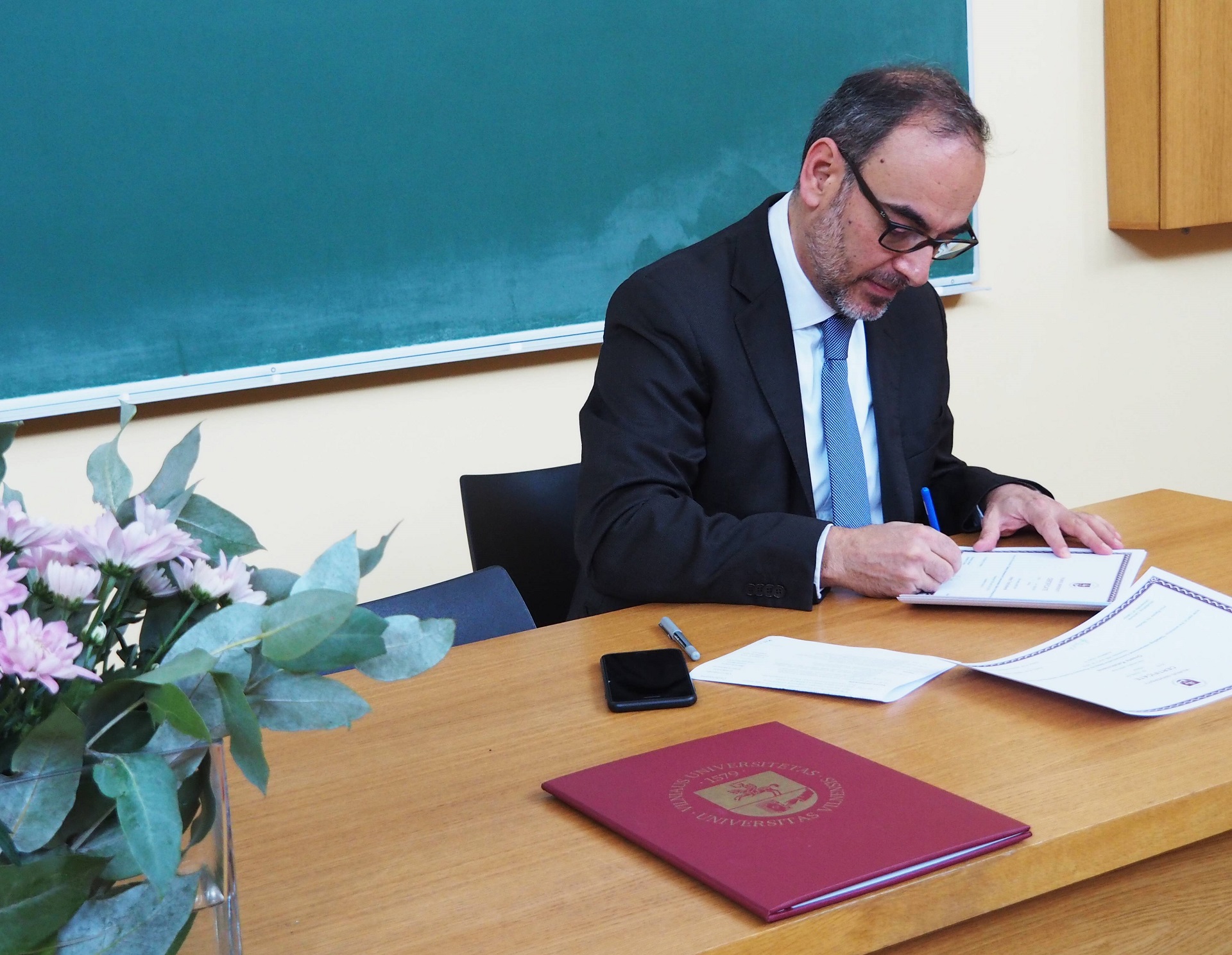Professor from Portugal - “Communication is a key issue in the delivery of healthcare services”

Students and lecturers of the Pharmacy Programme of the Faculty of Medicine at Vilnius University (VU MF) had an opportunity to participate in a conference about immunisation with a special overview of a pharmacist’s communication with members of the public. The lectures and conference were presented by Afonso Miguel Neves Cavaco, an associate professor from the Department of Social Pharmacy of the Faculty of Pharmacy of Lisbon University in Portugal.
The main organiser of the event was Indrė Trečiokienė, who is a lecturer at VU MF and a PhD student at the University of Groningen. According to I. Trečiokienė, A. Cavaco’s visit was part of the successful cooperation of the Faculty of Medicine with foreign colleagues and provided particular benefit to students, who gain knowledge, experience and skills from international level professionals without leaving the premises of VU.
“Our aim is to strengthen our pharmacy programme, and one of our top priorities is to teach our pharmacists how to communicate effectively with patients. We are delighted to invite world-renowned educators in the field of pharmacy who can help us integrate the development of communication skills into the curriculum and provide life-long learning to pharmaceutical professionals,” I. Trečiokienė said.
Afonso Cavaco is a well-known researcher who graduated the Faculty of Pharmacy at the University of Lisbon, defended his PhD at the School of Pharmacy at UCL (formerly University of London), and did postdoctoral studies at the Bloomberg School of Public Health at Johns Hopkins University (USA). His main areas of interest are public health and communication in health care, applied communication in pharmacies and the practice of medicine, social pharmacy, and healthcare services.
“Communication is a key issue in the delivery of healthcare services. In the context of a pharmacy, pharmacist–patient communication may vary from brief periods of counselling to extensive consultations about pharmaceutical care. Many community pharmacies have developed practices to facilitate the effective delivery of pharmaceutical care, although the nature and extent of the services differ widely from country to country,” A. Cavaco explained.
A. Cavaco speaks highly of the new Pharmacy Programme at the VU MF and believes that communication studies will help to prepare high-level pharmacy specialists with excellent communication skills, making pharmacists very active participants in the healthcare system. Researcher believes pharmacy communication is extremely important.
“In my PhD studies, the factor of communication was one of the main independent variables for explaining trends in modern pharmaceutical research and practice. If you as a pharmacist want to improve your pharmacy, you have to control communication,” Professor said. According to him, communicating with a customer in a pharmacy is providing a pharmaceutical healthcare service.
In Portugal, pharmacists do not prepare or prescribe medicines. They only help the patient choose the correct pharmaceutical preparation or equipment or answer related questions. It is a special kind of communication that is a bit different from the interaction between doctors and patients and should be carefully adapted to each specific situations both a science and an art.
“In every community pharmacy in Portugal, there is a special, isolated room for pharmaceutical consultations – this is a legal requirement, because talking about our health issues is a private matter. When it is necessary to give a patient an advice about a particular health matter, the interaction should be quite clear and structured. Every pharmacist needs to know the specific rules of such communication,” A. Cavaco stressed.
Pharmacy degrees in Europe prepare pharmacists to put their knowledge into practice, helping patients make the best use of their medication, suggesting what patients should do, and providing advice that will help patients avoid contracting various infectious diseases and have healthy lifestyles. People often think that a pharmacist are not required any kind of specialised knowledge, A. Cavaco states that this attitude towards the pharmacists is wrong.
“The subject of communication is obligatory in many medical curricula in various medical programmes, including most pharmacy programmes. Pharmacy specialists have to be prepared to talk effectively, which includes educating patients. If you contribute to caring for the health of the customers in your pharmacy, who in general are patients (at least many of them), you are contributing to a better national healthcare system and better health of the population in general. And even to a happier society,” professor said.
Professor from Portugal is planning to return to Vilnius and continue teaching VU students and staff members. A. Cavaco admitted that he is very fond of traveling, getting to know the culture and uniqueness of other countries, that is why he hopes to get to know more about the famous library ant the whole VU during his next visit to Lithuania.